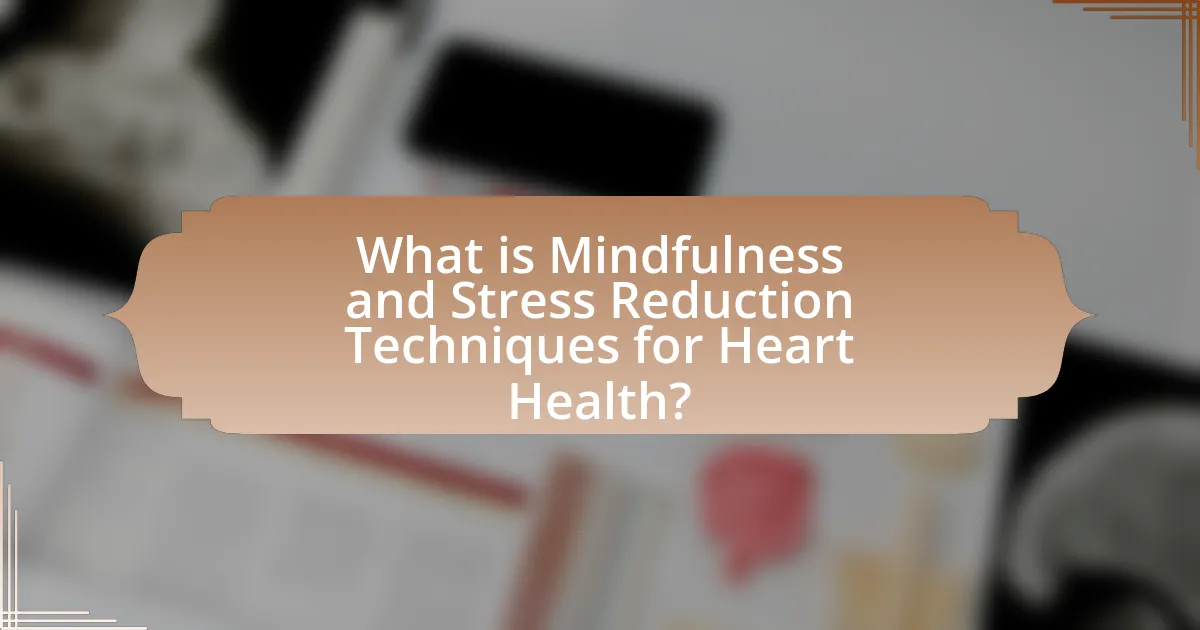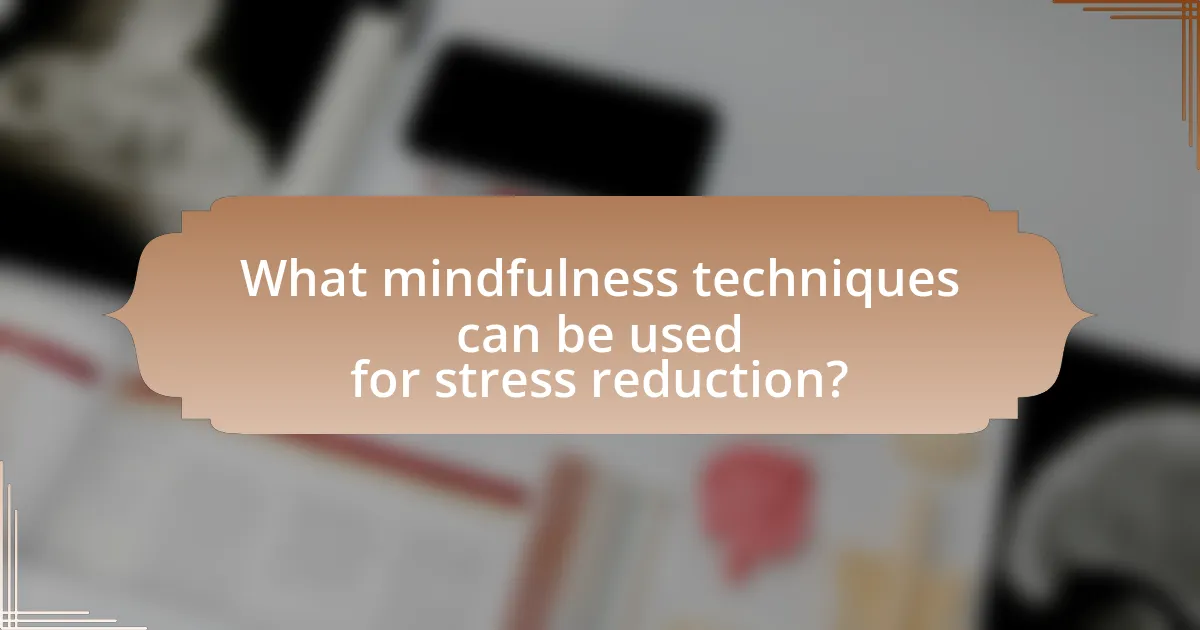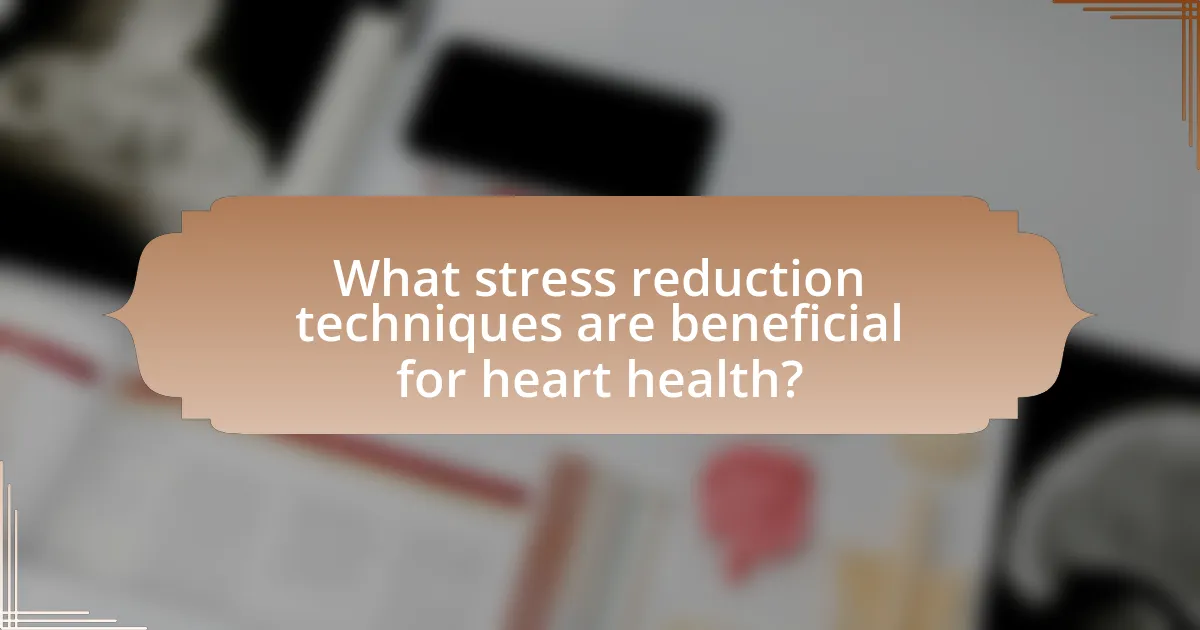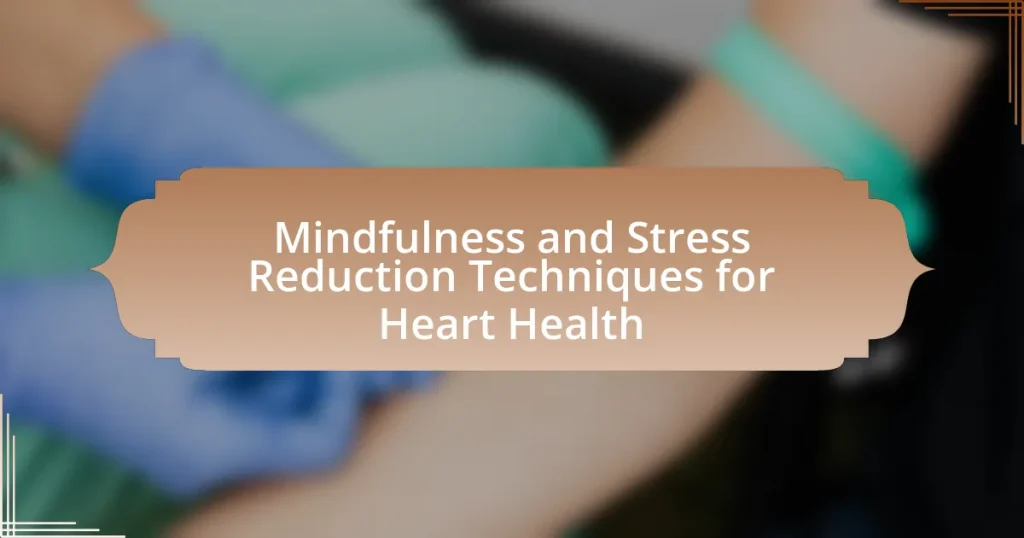Mindfulness and stress reduction techniques are essential practices that enhance awareness and alleviate stress, significantly benefiting heart health. Research indicates that these techniques, including mindfulness meditation, deep breathing, and progressive muscle relaxation, can lower blood pressure and heart rate, leading to improved cardiovascular function. The article explores the physiological changes in the heart during mindfulness practices, the impact of stress reduction on heart health, and the interconnectedness of heart health with mental well-being. Additionally, it discusses practical mindfulness techniques, the role of physical activity, nutrition, and sleep in promoting heart health, and offers tips for establishing a daily mindfulness routine.

What is Mindfulness and Stress Reduction Techniques for Heart Health?
Mindfulness and stress reduction techniques for heart health involve practices that enhance awareness and reduce stress, contributing to improved cardiovascular function. Research indicates that mindfulness meditation can lower blood pressure and reduce heart rate, which are critical factors for heart health. A study published in the Journal of the American College of Cardiology found that participants who engaged in mindfulness practices experienced significant reductions in stress levels and improved heart health markers. Techniques such as deep breathing, progressive muscle relaxation, and guided imagery are commonly used to promote relaxation and decrease stress, thereby benefiting heart health.
How do mindfulness and stress reduction techniques impact heart health?
Mindfulness and stress reduction techniques positively impact heart health by lowering blood pressure, reducing heart rate, and improving overall cardiovascular function. Research indicates that practices such as meditation and deep breathing can activate the body’s relaxation response, which counteracts the stress-induced release of hormones like cortisol that can harm the heart. A study published in the Journal of the American College of Cardiology found that participants who engaged in mindfulness meditation experienced significant reductions in blood pressure and improved heart rate variability, both of which are indicators of better heart health.
What physiological changes occur in the heart during mindfulness practices?
Mindfulness practices lead to several physiological changes in the heart, primarily characterized by reduced heart rate and improved heart rate variability. During mindfulness meditation, the body enters a state of relaxation, which activates the parasympathetic nervous system, resulting in a decrease in heart rate. Research indicates that individuals practicing mindfulness show a significant increase in heart rate variability, which is associated with better cardiovascular health and resilience to stress. A study published in the journal “Psychosomatic Medicine” by Brown et al. (2013) found that mindfulness meditation can enhance autonomic regulation, thereby positively influencing heart function.
How do stress reduction techniques influence heart rate and blood pressure?
Stress reduction techniques lower heart rate and blood pressure by activating the body’s relaxation response. Techniques such as deep breathing, meditation, and progressive muscle relaxation reduce sympathetic nervous system activity, which is responsible for the fight-or-flight response that elevates heart rate and blood pressure. Research indicates that mindfulness meditation can lead to significant reductions in both systolic and diastolic blood pressure, as well as heart rate, by promoting a state of calm and reducing stress hormones like cortisol. For example, a study published in the Journal of the American Heart Association found that participants practicing mindfulness showed a 5-10 mmHg decrease in blood pressure and a notable reduction in heart rate over an eight-week period.
Why is heart health important for overall well-being?
Heart health is crucial for overall well-being because it directly influences the body’s ability to function effectively and maintain a balanced state. A healthy heart ensures efficient blood circulation, which delivers oxygen and nutrients to vital organs and tissues, supporting their optimal performance. Research indicates that cardiovascular diseases are a leading cause of mortality globally, with the World Health Organization reporting that they account for 32% of all deaths each year. This statistic underscores the importance of maintaining heart health to prevent serious health complications and promote longevity. Furthermore, good heart health is linked to improved mental health, as conditions like anxiety and depression can be exacerbated by cardiovascular issues. Therefore, prioritizing heart health is essential for achieving comprehensive well-being.
What are the risks associated with poor heart health?
Poor heart health significantly increases the risk of cardiovascular diseases, including heart attacks and strokes. These conditions arise due to factors such as high blood pressure, high cholesterol, and diabetes, which are often linked to poor heart health. According to the American Heart Association, cardiovascular diseases are the leading cause of death globally, accounting for approximately 32% of all deaths in 2019. Additionally, poor heart health can lead to heart failure, arrhythmias, and other serious complications that can severely impact quality of life and longevity.
How does heart health relate to mental health and stress levels?
Heart health is closely linked to mental health and stress levels, as poor cardiovascular health can exacerbate anxiety and depression. Research indicates that individuals with heart disease are more likely to experience mental health issues, with studies showing that approximately 30-40% of heart disease patients also suffer from depression. Additionally, high stress levels can lead to increased heart rate and blood pressure, contributing to cardiovascular problems. The American Heart Association highlights that managing stress through mindfulness and relaxation techniques can improve both heart health and mental well-being, demonstrating the interconnectedness of these aspects of health.

What mindfulness techniques can be used for stress reduction?
Mindfulness techniques for stress reduction include meditation, deep breathing exercises, body scanning, and mindful walking. Meditation, particularly mindfulness meditation, has been shown to decrease stress levels by promoting relaxation and enhancing emotional regulation. Deep breathing exercises, such as diaphragmatic breathing, help activate the body’s relaxation response, reducing cortisol levels associated with stress. Body scanning involves focusing attention on different parts of the body to increase awareness and release tension, which has been supported by research indicating its effectiveness in reducing anxiety. Mindful walking encourages individuals to connect with their surroundings and their physical sensations, fostering a sense of calm and presence. These techniques are validated by numerous studies, including those published in journals like “Psychosomatic Medicine,” which highlight their efficacy in lowering stress and improving overall well-being.
How can meditation improve heart health?
Meditation can improve heart health by reducing stress and lowering blood pressure. Research indicates that regular meditation practice leads to decreased levels of cortisol, a stress hormone that can negatively impact cardiovascular health. A study published in the Journal of the American College of Cardiology found that participants who engaged in mindfulness meditation experienced significant reductions in systolic and diastolic blood pressure compared to those who did not meditate. Additionally, meditation enhances emotional well-being, which is linked to better heart health outcomes.
What types of meditation are most effective for stress reduction?
Mindfulness meditation, transcendental meditation, and loving-kindness meditation are the most effective types of meditation for stress reduction. Mindfulness meditation focuses on being present and aware of thoughts and feelings without judgment, which has been shown to lower cortisol levels, a key stress hormone. Transcendental meditation involves repeating a mantra to settle the mind, leading to reduced anxiety and improved emotional well-being, as evidenced by a study published in the Journal of Clinical Psychology, which found significant reductions in stress among practitioners. Loving-kindness meditation promotes positive emotions and compassion, which can enhance overall mental health and reduce stress, supported by research from the University of North Carolina that demonstrated its effectiveness in decreasing stress levels.
How long should one meditate to see benefits for heart health?
To see benefits for heart health, one should meditate for at least 20 to 30 minutes daily. Research indicates that consistent meditation practice can lead to reductions in blood pressure, heart rate, and stress levels, all of which contribute positively to cardiovascular health. A study published in the Journal of the American College of Cardiology found that participants who engaged in mindfulness meditation for 30 minutes a day experienced significant improvements in heart health markers over eight weeks.
What role does breathing exercises play in mindfulness?
Breathing exercises play a crucial role in mindfulness by enhancing focus and promoting relaxation. These exercises help individuals anchor their attention to the present moment, reducing distractions and fostering a state of awareness. Research indicates that controlled breathing can activate the parasympathetic nervous system, which lowers heart rate and decreases stress levels, thereby contributing to overall heart health. For instance, a study published in the Journal of Clinical Psychology found that participants who practiced mindful breathing reported significant reductions in anxiety and improved emotional regulation. This evidence supports the effectiveness of breathing exercises as a fundamental component of mindfulness practices aimed at stress reduction and heart health.
How do different breathing techniques affect heart rate variability?
Different breathing techniques significantly influence heart rate variability (HRV) by promoting autonomic nervous system balance. Techniques such as diaphragmatic breathing and paced breathing have been shown to enhance HRV, indicating improved parasympathetic activity and reduced stress levels. Research published in the Journal of Clinical Psychology by Brown et al. (2013) demonstrated that slow, controlled breathing can increase HRV, which is associated with better cardiovascular health and emotional regulation. Additionally, a study in the journal Frontiers in Human Neuroscience by Zaccaro et al. (2018) found that specific breathing patterns, like the 4-7-8 technique, can lead to significant increases in HRV, suggesting a direct link between breathing practices and autonomic function.
What are some simple breathing exercises for beginners?
Simple breathing exercises for beginners include diaphragmatic breathing, box breathing, and 4-7-8 breathing. Diaphragmatic breathing involves inhaling deeply through the nose, allowing the abdomen to expand, and then exhaling slowly through the mouth. This technique promotes relaxation and reduces stress. Box breathing consists of inhaling for four counts, holding the breath for four counts, exhaling for four counts, and holding again for four counts. This method helps to calm the mind and improve focus. The 4-7-8 breathing technique involves inhaling for four counts, holding the breath for seven counts, and exhaling for eight counts, which can help to reduce anxiety and promote better sleep. These exercises are supported by research indicating that controlled breathing can lower heart rate and improve overall cardiovascular health.

What stress reduction techniques are beneficial for heart health?
Stress reduction techniques beneficial for heart health include mindfulness meditation, deep breathing exercises, and regular physical activity. Mindfulness meditation has been shown to lower blood pressure and reduce stress hormones, which can improve cardiovascular health. Deep breathing exercises activate the body’s relaxation response, leading to decreased heart rate and lower blood pressure. Regular physical activity, such as aerobic exercise, not only reduces stress but also strengthens the heart and improves circulation. Studies indicate that individuals who engage in these techniques experience lower rates of heart disease and improved overall heart function.
How does physical activity contribute to stress reduction?
Physical activity contributes to stress reduction by promoting the release of endorphins, which are chemicals in the brain that act as natural painkillers and mood elevators. Engaging in regular exercise has been shown to decrease levels of the body’s stress hormones, such as adrenaline and cortisol. A study published in the Journal of Clinical Psychiatry found that individuals who participated in aerobic exercise experienced significant reductions in anxiety and depressive symptoms, highlighting the mental health benefits of physical activity. Additionally, exercise can improve sleep quality and increase self-esteem, both of which are crucial for managing stress effectively.
What types of exercises are best for heart health and stress relief?
Aerobic exercises, such as walking, running, cycling, and swimming, are best for heart health and stress relief. These activities improve cardiovascular fitness, lower blood pressure, and enhance mood by releasing endorphins. Research published in the Journal of the American College of Cardiology indicates that regular aerobic exercise can reduce the risk of heart disease and improve overall heart function. Additionally, practices like yoga and tai chi combine physical movement with mindfulness, effectively reducing stress and promoting relaxation, as supported by studies in the Journal of Clinical Psychology that show significant reductions in stress levels among participants.
How often should one engage in physical activity for optimal heart health?
To achieve optimal heart health, individuals should engage in physical activity at least 150 minutes of moderate-intensity aerobic exercise per week, or 75 minutes of vigorous-intensity exercise. This recommendation is supported by guidelines from the American Heart Association, which emphasize that regular physical activity helps lower the risk of heart disease, improves cardiovascular fitness, and aids in weight management. Additionally, incorporating muscle-strengthening activities on two or more days a week further enhances heart health benefits.
What lifestyle changes can enhance mindfulness and stress reduction?
Engaging in regular physical activity, practicing meditation, and maintaining a balanced diet can significantly enhance mindfulness and stress reduction. Physical activity, such as aerobic exercise, has been shown to reduce anxiety and improve mood by releasing endorphins, which are natural stress relievers. Meditation practices, including mindfulness meditation, have been scientifically validated to decrease stress levels and increase emotional regulation, as evidenced by studies published in journals like JAMA Internal Medicine, which found that mindfulness meditation can lead to moderate improvements in anxiety, depression, and pain. Additionally, a balanced diet rich in fruits, vegetables, whole grains, and omega-3 fatty acids supports brain health and can improve overall emotional well-being, as indicated by research from the American Journal of Psychiatry, which links diet quality to mental health outcomes.
How does nutrition impact stress levels and heart health?
Nutrition significantly impacts stress levels and heart health by influencing physiological responses and overall well-being. A balanced diet rich in fruits, vegetables, whole grains, and healthy fats can lower stress hormones like cortisol and improve heart function. For instance, studies show that omega-3 fatty acids found in fish can reduce anxiety and inflammation, which are linked to heart disease. Additionally, a diet high in antioxidants, such as those found in berries, can combat oxidative stress, thereby supporting cardiovascular health. Research published in the Journal of the American College of Cardiology indicates that individuals who consume a Mediterranean diet experience lower levels of stress and reduced risk of heart disease.
What role does sleep play in mindfulness and heart health?
Sleep is crucial for both mindfulness and heart health, as it enhances cognitive function and emotional regulation while reducing cardiovascular risks. Adequate sleep improves attention and awareness, which are essential components of mindfulness practices. Research indicates that insufficient sleep can lead to increased stress and anxiety, negatively impacting heart health by elevating blood pressure and inflammation. A study published in the Journal of Clinical Sleep Medicine found that individuals who reported poor sleep quality had a higher prevalence of heart disease, highlighting the direct link between sleep, mindfulness, and cardiovascular well-being.
What practical tips can be implemented for mindfulness and stress reduction?
Practical tips for mindfulness and stress reduction include practicing deep breathing exercises, engaging in regular meditation, and incorporating mindful movement such as yoga. Deep breathing exercises, which involve inhaling deeply through the nose and exhaling slowly through the mouth, can activate the body’s relaxation response, reducing stress levels. Regular meditation, even for just a few minutes daily, has been shown to decrease anxiety and improve emotional well-being, as evidenced by research published in the journal “Psychological Bulletin,” which found that mindfulness meditation significantly reduces stress. Mindful movement, such as yoga, combines physical activity with mindfulness, promoting relaxation and reducing stress, supported by studies indicating that yoga can lower cortisol levels, a hormone associated with stress.
How can one create a daily mindfulness routine for heart health?
To create a daily mindfulness routine for heart health, one should incorporate practices such as meditation, deep breathing exercises, and mindful walking. Research indicates that regular mindfulness practices can lower blood pressure and reduce stress, both of which are beneficial for heart health. For instance, a study published in the Journal of the American College of Cardiology found that mindfulness meditation can significantly reduce cardiovascular risk factors by promoting relaxation and decreasing anxiety levels. Establishing a routine could involve setting aside 10-20 minutes each morning for meditation, practicing deep breathing for a few minutes throughout the day, and taking mindful walks to enhance awareness and reduce stress.
What are some common challenges in practicing mindfulness and how can they be overcome?
Common challenges in practicing mindfulness include difficulty concentrating, managing distractions, and experiencing discomfort with emotions. To overcome these challenges, individuals can establish a consistent practice schedule, utilize guided meditations, and create a conducive environment free from interruptions. Research indicates that regular mindfulness practice can enhance focus and emotional regulation, as evidenced by a study published in the journal “Psychological Science,” which found that participants who engaged in mindfulness training showed significant improvements in attention and emotional resilience.










